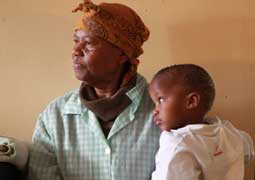
The Portfolio Committee on Social Development told the national and provincial Department of Social Development officials to ensure proper understanding of government policy to ensure its proper translation into government programmes to change the lives of the people, especially the historically marginalised ones.
The values and the objectives that lie deep underneath the policy should find expression during its translation into service delivery programmes of the government to the people. If those objectives and values are lost on the way, there can be no meaningful service delivery. That was what the Chairperson of the Portfolio Committee on Social Development, Ms Zoleka Capa, told senior officials of the Western Cape Provincial Government and the National Department of Social Department.
“Please ensure that you grasp the tenets of the mandate of the Department of Social Development and understand the meaning of the policies of government on social development to ensure their proper translation into service delivery programmes, that are aimed at turning the tide of poverty and vulnerability especially against women, children and senior citizens,” stressed Ms Capa.
The committee embarked on an oversight programme in the Western Cape’s Worcester and De Doorns communities, assessing the performance of the early childhood, community development and nutrition and rehabilitation centres and substance and alcohol abuse victims’ shelters. The De Doorns’s Mooigezicht Estate Creche, One Service (Club 60) Centre and Masibambisane Community Development and Nutrition Centre; Worcester’s House of Hope and Brave Heart Home were among the centres the committee visited.
At the Mooigezicht Estate Creche, a farm community facility, the committee noted non-compliance with the policy on, among other things, governance, integration of the historically divided people on the grounds of ethnicity and otherwise in the same geographic area, and the provision of social workers at the facility.
Members of the committee urged the coordinator and the teachers of the crèche to teach the children South African languages in the same class, and the new values system of non-racialism and non-sexism. “Please don’t reproduce the old streotypes of racism and sexism. Turn the centre into an incubator of delivery of future South African citizens that were visualised by Tata Nelson Mandela and Mama Albertina Sisulu,” emphasised Ms Capa.
On the trend of the exclusion of the African colour in the creche’s governing body, the committee highlighted its unhappiness on the lack of proper reflection of the demography of the farm community and told the creche’s coordinator and senior officials of the Department of Social Development to correct that as soon as possible. “The governing body of the crèche must reflect the existence of all the people whose children it exists for, in colour, culture and language. The crèche must be a symbol of integration and promotion of cultural diversity in the area. You must not be apologetic when dealing with such matters. Be decisive,” said Ms Capa.
The committee told the crèche coordinator that the voice of all the parents of children that are at the crèche, including African women and farm workers, is heard at the crèche. The crèche must not be dominated by a certain group of people on any grounds. The committee told the officials of the Western Cape’s Department of Social Development to ensure that all what is due to the crèche reaches them, including the services of social workers.
At Masibambisane Community Development and Nutrition Centre in De Doorns, the committee told the officials of the department to ensure that the implementation of government policy is properly translated in order to achieve the national objectives of changing the lives of historically marginalised people, especially vulnerable women, children and senior citizens. Ms Capa called upon the leaders of the community development and nutrition centres to ensure that the vegetables supplied to the centre come from the community where the centre exists.
“The leadership of the centre and all its stakeholders must take upon themselves to ensure that the vegetables that are supplied to the centre are locally produced. They cannot come from outside De Doorns. The vegetables must be produced by the community where the centre is. The economic opportunities the centre creates shouldn’t be used by outsiders. They are created for local people, make the centre vibrant and its vibrancy must translate into the vibrancy of the community at large,” said Ms Capa.
The committee heard of the evolution of the centre from its humble beginnings of being a centre for just seasonal farm workers. According to the briefing the committee received, the centre was created for the provision of meals to seasonal farm workers who, when the season was, over would be left vulnerable to poverty. With the assistance of volunteers in the spirit of Vuk’u Zenzele, the centre is a beacon of hope to the majority of people who are not sure about where they will be getting their next meal in any given day. “I am sure about a nice full meal a day and I’m very proud of our government about that,” said 64-year-old Ms Angela Peterson of De Doorns.
By Mava Lukani
14 September 2018

